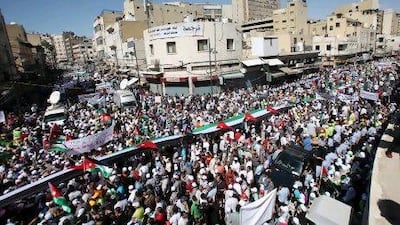Amman // Thousands of Islamists marched through Amman yesterday calling for political reform and an end to corruption in the biggest display of street power by the Muslim Brotherhood since protests began in Jordan last year.
The "Friday to Rescue the Nation" rally took place a day after King Abdullah II dissolved parliament and called for elections.
Some analysts speculated that rather than a concession to the opposition, the timing of parliament's dissolution was meant to send a message to the Islamists that they are no longer welcome in the political arena.
The Islamic Action Front, a Muslim Brotherhood offshoot, and Jordan's main opposition bloc, has been angered by the slow pace of reforms promised by the king after the Arab Spring swept the region in early 2011. The group is calling for broader political representation and a more democratic parliament.
While most of the estimated 15,000 people who marched yesterday were supporters of the Muslim Brotherhood, the protesters included liberal and youth groups.
Demonstrators from across the country flocked to the main street leading to the Husseini Mosque in central Amman after Friday prayers and chanted: "We want to reform the regime."
"I am here because we have not seen any reforms until now," said Ahmad Hamdi, a youth member of the Muslim Brotherhood's political wing, Islamic Action Front. "We will continue to take to the streets," he said.
Hundreds of youths carried banners saying: "The corrupt are God's enemies" and "For how long will the regime protect corrupt officials?"
Other placards called on the powerful security forces to end their pervasive role in political life.
Sheikh Hamam Said, the head of the Muslim Brotherhood in Jordan, said the move by the monarch to dissolve the tribal-dominated parliament on Thursday was not enough.
His party will not go back on a decision to boycott future elections under the current political system, he said. New elections are expected early next year although no date was set by the king.
The Islamists say electoral laws passed last July are tailored to curb their influence by drawing constituencies lines in favour of sparsely populated, pro-government tribal areas that have a majority of parliamentary seats. Heavily populated cities, which are their traditional strongholds, are grossly under-represented, they say. Jordan has had nearly two years of peaceful street protests by Islamists, tribal figures and leftists, inspired by the Arab Spring uprisings, but they have focused on reforming government and limiting King Abdullah's powers rather than toppling him. "The regime cannot keep turning its back to the reformers demands. Its recipe for reform is a corrupt one. We cannot continue with the same election law," said Murad Adayleh, a member of the executive committee at the Islamic Action Front. "We want constitutional amendments where people become the source of the power."
While some said the dissolution of parliament was a concession to the opposition, others said it was a sign that the king was shutting the door on the Islamists' participation in the reform process.
"This is a message to the Islamists that the election law will not be opened for debate and that they [the Islamists] are not welcome in the political game," Fahed Kheitan, a columnist at Al Ghad newspaper said during the protest. "They will still attempt to mobilise the street as a major power and try to delegitimize the upcoming parliament.
"But the state has been capable of containing the streets. The Syrian revolution is taking time and people are concerned about the country's stability."
While the march passed peacefully, the country has been tense in the past week as the Muslim Brotherhood hyped the event by promising to bring 50,000 supporters on to the streets of Amman.
A dozen protesters representing youth movements in the south of the country were jailed in recent weeks. Their charged ranged from illegal assembly, slandering the king to undermining the regime.
A dozen protesters representing youth movements in the south of the country were jailed and were charged with undermining the regime in recent weeks.
Police yesterday attempted to ban participants arriving in buses for the protest. Security was tight and there were checkpoints in the roads leading to the city centre.
A counter demonstration in support of the king, which was set to take place yesterday, was called off on Thursday by organisers in an attempt to diffuse tensions.
foreign.desk@thenational.ae with additional reporting by Agence France-Presse and Reuters

